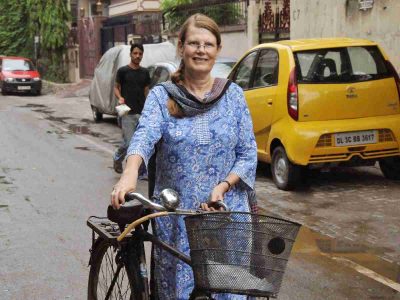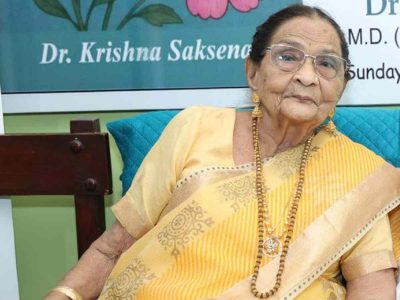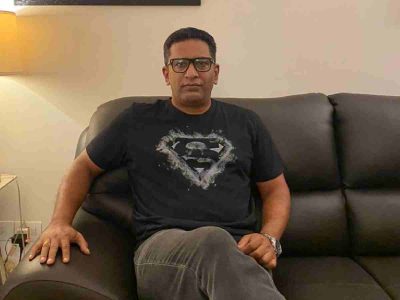The times, they are a’ changing, but some love stories are timeless in the way they play out. These couples have walked on fire and stood in the eye of the storm, hand-in-hand all along. Patriot spoke to some of these couples who are still very much in love, despite the hands they were dealt in life
Love knows no condition
“Na umr ki seema ho, na janm ka ho bandhan,
Jab pyar kare koi, to dekhe keval mann…”
The lyrics of this timeless ghazal, by Jagjit Singh, seems to have been conceived especially for this very couple.
“Nothing describes our love story better than this song,” says the newlyweds. For Shweta Mahawar (39) and her husband Alok Kumar (34), there were countless differences and a plethora of problems to overcome before their union could be solemnised.
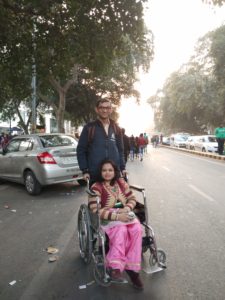
Inflicted by polio when she was just two, Shweta, who hails from Sitapur, a small town in UP, has been wheelchair bound ever since. Right from her teenage years she felt that her condition would keep her from finding her dream life partner.
Her parents were more hopeful, and kept looking for a prospective groom. On turning 27, she turned to a matrimonial site but that too brought disappointment.
It’s not as if there were no responses. “How many lakhs are you ready to pay for dowry?” People directly contacted her with this question. “This cleared one thing in my mind, that in Indian society a disabled woman will only get married if the family can provide a lot of money and property. I decided not to burden my family with the financial pressure and told them never to broach the topic again,” says Shweta.
She stopped going out of the house but this left her craving for company and felt extremely lonely. At the age of 34 she decided to get a hold of her life and started socialising.
With her new-found confidence, she joined Inclov, an inclusive dating app focusing on people with mental and physical disability in May 2017. “I decided to explore my life and wanted to know if people with conditions similar to mine are equally frustrated,” she adds with a laugh.
This led her to our hero in the story, Alok Kumar. A tech graduate from Delhi, he is an opinionated trailblazer in his own right. An active proponent of ‘Childfree by choice’ marriage, he never hesitates to question accepted societal norms and addresses taboos head-on in his YouTube channel ‘Forbidden Truth’ which has quite some fan following.
In his quest to attack prevailing stigmas in society he landed up in Inclov, not in search of love but to research on the subject of sexual needs of disabled people for his channel. But fate had something else in store for them.
He recalls viewing Shweta’s profile in the app but assumed a girl from a small town would never be in tune with his way of thinking and outspoken nature. Until a few months later in December, when Shweta send him a request and they matched.
Like every unusual love story, theirs too wasn’t a smooth one. And this one even began with a fight. “In our first chat, she asked for my number and I gave it, but when I asked for the same she replied with another question and this did not sit well with me. I made it clear if she can’t provide her number then I don’t wish to take the conversation ahead,” relates Alok with a sheepish smile.
Shweta thought he was coming off quite rude, and almost rejected him for his attitude, but on re-reading the conversation, it hit her that he was right in his own way. She gave him her number and asked him to call her some time.
The same day, they talked for the first time. Shweta recalls the exact time: “He called at 9:30 pm on 20th December and out first phone call lasted for almost two hours. The first conversation we shared was quite open. We shared all our issues and the prejudice we faced in our lives. We bared it all. There was nothing to hide.”
Soon the phone calls became regular and they chatted over video calls as well. Eleven days later, on 31st December, they confessed their feelings for each other, but neither recalls a formal proposal.
“It was almost 1 am and while chatting he suddenly blurted out that he missed me. I had shared my photos of mehndi with him the previous day and he conveyed to me that he wished to hold my hand and not just see me through his phone. From then on, we decided that we are going to be together, despite all odds,” says Shweta.
Yet both hesitated to approach their parents. Alok being out of a job did not help Shweta’s cause; his decision to marry a disabled girl older than him along with his “commitment to child-free marriage” was enough reasons for his parents to disown him.
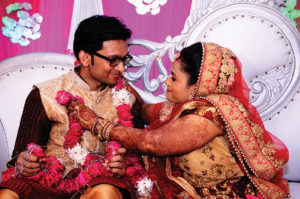
Fortunately, he soon landed a job as a computer teacher, but that too wasn’t enough for Shweta’s parents to accept their relationship. Shocked out of their wits, they couldn’t come to terms with her getting married at the age of 39 to a man five years younger.
Shweta, however, made it quite clear that under no circumstances will she step back from this relationship. “I started talking to him in front of my parents and even on speaker to make them understand how much he cares. Gradually my mother started understanding and she finally agreed and selected a date for engagement,” Shweta says.
In July 2018, they finally tied the knot. It has been almost six months but Alok’s parents are yet to bless the marriage. That does not bother them much. Looking at her fondly, he jokingly calls her a ‘dinosaur’ for her boldness, honesty and devil-may-care attitude.
Despite having several differences from political, religious to even their choice of location for their honeymoon, their love has only grown with each passing day.
“Love is unconditional. If you wish to have unconditional love, then you have to remove all conditions on your part as well. Whoever had told me that they would have married me had I been different, I would like to tell them that I am glad you rejected me because otherwise I wouldn’t have ever found my soulmate,” Shweta concludes.
‘We are humans first. Religion comes later’
It started with a simple bet. The drama that ensued for the next decade will perhaps put your favourite Bollywood romance to shame.
Back in 2001, Nazimul Hussain moved to Jhatikgra village in Haryana. Hussain’s father got transferred as the imam of the village mosque, and got his son enrolled in fourth standard of the local school.
Right next to the mosque, lived Priyanka – ‘a bubbly, happy-go-lucky girl’, Hussain recalls. They never had any interaction until Class 9. The arrival of a new principal who was known to be quite strict, brought a change in this situation
Playing hide-n-seek in the neighbourhood, Priyanka came up to Hussain, the usual topper of his batch, and asked him if he would be able to meet the scrutiny of the strict principal. ‘Tu kar lega pass?’ Confident about himself, he placed a bet.
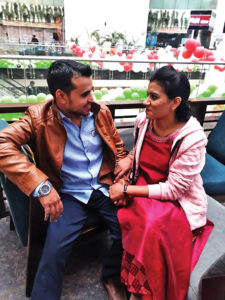
This question set the beginning of a relationship that battled severe resistance from all. Sticking to his word, he made sure he passed — and that too, came first. Priyanka asked for a party and he bought some Pepsi and chips for her but unfortunately, she never got to enjoy that. Calling him ‘mullah and kattar’, Priyanka’s father asked him to leave when he landed up at their place with his little party arrangements.
Scared of their families’ reaction, their romance got restricted to just sneaking a peek at each other. Soon he learned that she had failed in Class 9 and dropped out of school. Asking for a promise in return for winning the bet, Hussain insisted she gets back to school and she did.
The trajectory of their love story in their school life is not very far off from the love song sequence of any romantic film. Not very good in academics, Priyanka got reprimanded quite often in front of the entire class. “Her hair got messed up whenever our teachers used to punish her and I couldn’t bear to look at it. I used to put my head down on the desk.” To help her pass her exams, he used to make handmade copies of what we call micro xerox today and pass it down to her, he adds with a sheepish grin.
Then came another twist in the story. A new ‘handsome face’ turned up in their school and had his eye on Priyanka. Soon jealousy crept in and played a pivotal role in taking the plot forward. Feeling insecure, Hussain took Priyanka behind the water tank of their school and stole a kiss.
In their small village, word soon spread about their budding romance leading to a huge uproar. Outraged, some of the local boys hit him black and blue to show him his place. The next day Hussain reached school early along with his brothers and they exchanged blows with the local boys.
This altercation did not sit well with the villagers. “Tu hain kis khet ki muli, jo itna tu uchhal raha hain?” they questioned him. Not just Hussain, they started harassing his father as well.
Graduating from school, Priyanka went off to a college in Najafgarh and Hussain took up a correspondence course in DU. Doing odd jobs on the side, he saved up money to take her out for dates in parks. “There’s not a single park in Delhi we haven’t been to,” says Hussain.
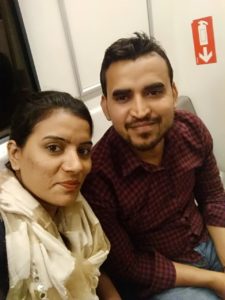
Meanwhile, Priyanka’s father was on a vigorous search for a groom to get her married. From 2013 began another chapter in their lives.
From LIC agent, to call centres, to delivery agent, Husain took up all odd jobs, to make a living. While he knocked doors looking for jobs, Priyanka was equally stressed trying to keep her father from marrying her off. Not having any luck at a permanent job, Hussain started concentrating on getting Priyanka employed. She took up a job as a multi-tasking staff at a food and supply department in Delhi.
Things turned worse when the villagers kicked them out of their home. “My father also used to work as an exorcist and people started thinking he was scamming them and threw us out of the village. They vandalised our mosque and I filed an FIR,” Hussain adds. This came with a warning that if they ever set foot again in the village, they would not live to see another day.
Following this, he took up a job as a ticket operator in DMRC and things were starting to look up. He brought Priyanka to meet his parents and they left no doubt in conveying their disapproval of their relationship.
Hussain left his family and slept in and around the premises of the Metro station. At this juncture, not wasting any more time, they decided to get married without telling their parents. In August 2017, they got their religious marriage registered in Karkardooma Court.
What followed next was a nightmare. Within a month, Priyanka’s parents came to know about their marriage and locked her up, cutting off all contact with Hussain.
Frantic for help, he went back to the court to ask for help and they demanded Rs 20,000 to rescue her legally. Not having enough money, he turned to the SDM office and got caught up in more legal tangles.
“All this while I had no contact with her. I was hopeless. They landed up at the Metro station and gave me death threats,” recalls Hussain. Meanwhile Priyanka managed to make a phone call and told him she cannot stand the torture anymore and she probably wouldn’t last any longer.
Not knowing what else to do he got in touch with a high court lawyer who finally helped him out and filed a petition. Priyanka managed to run away from home and landed up in Delhi and soon they got a call from the court where a two-judge bench heard their case and in a few months they got married under the Special Marriage Act.
Their fight was still not over. Hussain’s parents turned them away and not having any place to stay they went to friends’ and relatives’ places for shelter until they found a place to rent in Najafgarh.
It’s been one year and three months now for them in the same house now. A Rohit Shetty fan, Priyanka loves spending her evening watching films. She loves her paneer from a particular outlet in Rajouri Garden only and Hussain makes it a point to get it for her.
Hussain now works as a computer operator in Delhi Urban Shelter Improvement Board and Priyanka continues working at her old job.
Awarded by Dhanak, a Delhi-based NGO which has been providing legal and financial aid to interfaith and inter-caste couples for their bravery from 2015, things have been ‘bindass’ for them ever since.
“Life mein koi dharam nahi. Bolne wala bolta hain (Life has no religion, some people will always talk) but I don’t care. I found the love of my life and that’s all that matters.” says Priyanka.
Made for each other
Love knows no reason, no boundaries, no distance. Even language is not a limitation. So true, especially in the case of the married couple Balbir Krishnan — an artist of repute who grew up in rural Uttar Pradesh — and Michael Giangrasso, the US citizen who was a teacher at American School in Delhi for many years.
A couple can’t be more different. And their love ensued at a time when Balbir couldn’t speak English. Make no mistake, both have strong personalities and are fairly ‘individualistic’, neither was it love at first sight. Their love has blossmed over the years, has become stronger. Now married for nearly six years, they love to stay together in a room of a big house with many rooms.

Balbir, in his mid-forties, belongs to a Jaat farming family, knew about his sexual orientation from an early age. But growing up as a gay man in rural western Uttar Pradesh was worse than a nightmare. “It was difficult to be a gay in an Indian village (in Bagpat district). When I was growing up, I didn’t hear the word gay, there was no literature (to held him come to terms with his sexuality). I was different and was not fitting in a box,” he narrates. He was, however, never in denial. He became a regular victim of one his uncles who would threaten him to tell his father of his “wickedness”. Others joined him in abusing Balbir, his Khap cronies, older boys, even the married to abused him. “By my mid-teens, rape had become an everyday event in my life” Balbir recounts, scars on his body bears testimony to his abusive childhood.
In his village, also when he went to Agra to study art, he’d observe secretly men indulging with men, despite being married, though in public they were honorable heterosexuals. Balbir also tried to have a fling with a woman, but not for long, “It was unfair to her and to me,” he says. He was dejected and disheartened, after many restless nights in 1996, when going was difficult, he decided to end his life. He lay on the railway track, and just as the train was about to pass, something happened, light of reason dawned on him, he tried to get off the track, just enough, the train passed over his knees and severed his legs.
It took Balbir two years recover, there was a phase when doctors weren’t confident that he’ll make it. It was during this time that Balbir honed his exceptional talent, but also made a promise to himself: to live to the fullest. There were challenges, and Balbir’s not a quitter. “I lost my legs but won my life,” he says with a twinkle in his eyes.
He draws bold male figures in a way very few can. His work fairly radical, and in 2012, at the Lalit Kala Akademi’s Rabindra Bhavan where his work was on display was attacked by a hooded assailant and some of his paintings destroyed. Balbir remained unfazed and continued to do what he’s best at. His art is reflection of different phases in his life, his state of mind, his times. After the accident, he painted wretched children and suffering humanity, he also experimented with abstract. Despite, in his own words, “there are threads of unity that run through my work. It’s autobiographical.”

Michael met him at one of his exhibitions in September 2012. There was a connect, and he felt the need to meet Balbir again. Destiny was kind, they met again, and again. The day Balbir came to stay with him, the latter carried him to bed, after he removed his artificial legs. This gesture has had profound impact on Balbir. “I knew he has a heart of gold,” Balbir says.
Michael is not new to Delhi, he has lived and worked in India for ten years. He had a certain lifestyle with creature comforts, and Balbir a rural artist who wasn’t able to speak English during their initial courtship. Language was not much of a barrier, but it took a while for them to settle down. Initially, when they’d have an argument, it would take days before they resumed talking. Now, they just can’t sustain it for even ten minutes. “We are very different. Both are strong individuals and individualistic. The more we came to know each other, acceptance grew to the point that, in our house of several rooms, we want to be in the same room,” says Michael.
Balbir never thought he’d be married. Life is strange, things find reasons to happen in most unexpected ways. They had little idea as to how they will weave a life together, but were fairly certain they’d stay together. Marriage was a tricky issue both in India and the US, as well. But in June 2013, the US Supreme Court struck down laws against gay and lesbian citizens, mandating that the US Federal government recognize same-sex marriage. “That victory changed our world forever. In that instant, Balbir and I were free to marry. We promised ourselves to one another,” Michael recollects with joy. Rhinecliff Hotel on New York’s Hudson River is where they got married six years ago, in the presence of Michael’s mother, his two adopted grown-up sons; their wives and baby Julia.
It was a dream come true. “Balbir is one in a million,” says Michael, and has a charismatic personality. When they go out, its Balbir who gets most of the attention. They are happy that Section 377 is repealed in India. Balbir was happy to mention that he read about the recently held Mumbai Pride Parade where people didn’t cover their faces. He hopes no one should be subjected to the ordeal that he had to go through in his formative years.
They miss India, now that they have shifted to the US. Balbir is a green-card holder, still retains Indian citizenship. It’s not easy to settle down in a new place so radically different from home. But Balbir has faced much graver challenges back home in India only to become stronger, yet retain his gentleness. And love is such a strong binding force. All struggles become pleasurable.
CUPID BEHIND BARS
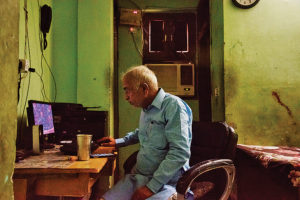
Self-proclaimed ‘Cupid’ Sanjoy Sachdeva was arrested in end-January. He is the founder of Love Commandos, an NGO that was supposed to help and provide shelter to couples in trouble. Sachdeva claimed that he would help couples whose parents were opposed to their relationship, those that are facing social ostracism, or were from different castes or communities.
Patriot spoke to Chief of Delhi Commission for Women (DCW) Swati Maliwal to properly understand exactly what Sanjoy Sachdeva had been up to while he was supposedly running his NGO for lovers.
“He used to treat the couples quite badly,” she says. On top of that, money was extorted from them. Many even complained of being emotionally abused, as he would take away their identification documents and hold them for long periods of time. “He is an alcoholic, and often forced the couples living in the shelter homes to drink too,” says Maliwal. “These couples are already in a vulnerable place.”
After the first complaint came in, DCW conducted a raid. Four couples were found, being held against their will. They complained of being unable to retrieve their documents, and being charged hefty amounts in advance for lawyers’ services, which never yielded anything concrete. Sachdeva had a system of charging each couple differently. Since he was already in possession of their legal documents, he would calculate how much a couples would be able to afford.
On top of everything, his quarters were within the NGO compound. Every time the women had to use the washroom or the kitchen, they would have to pass through his room. This too was problematic and intrusive for the women. Apart from this, he would ask them to perform personal and demeaning favours like pressing his feet.
Since his arrest, six more complaints have been filed against him by couples who had enlisted his help in the past. The Investigating Officer and the SHO of the Paharganj Police Station declined to comment on the case for now.


